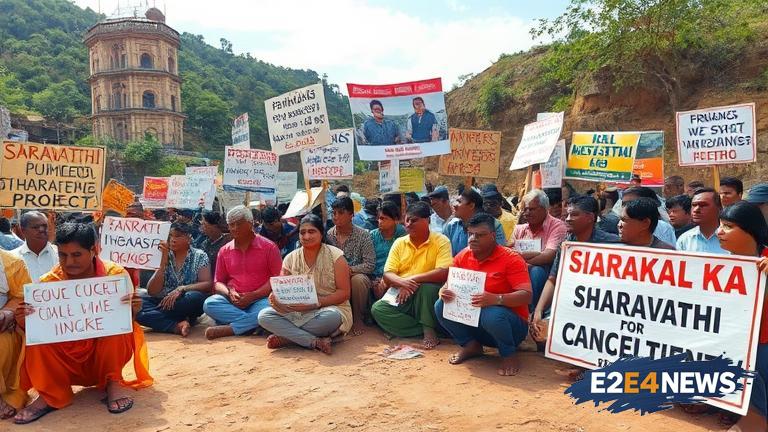The proposed Sharavathi Pumped Storage Project has sparked widespread protests among the residents of Sagar in Karnataka. The project, which aims to generate 1,000 MW of power, has been met with resistance from the local community, who are concerned about the potential environmental impact and displacement of people. The protesters argue that the project will lead to the destruction of forests, wildlife habitats, and water sources, ultimately affecting the livelihoods of thousands of people. The project involves the construction of a dam, tunnels, and other infrastructure, which will require the acquisition of large tracts of land. The residents are also worried about the potential risk of earthquakes and landslides, which could be triggered by the project. The protesters have been demanding that the government scrap the project and instead focus on renewable energy sources. They have also been seeking compensation and rehabilitation for those who will be affected by the project. The Karnataka government has been trying to convince the residents that the project is necessary for the state’s energy needs, but the protesters remain unconvinced. The project has been in the pipeline for several years, but it has been delayed due to opposition from the local community. The protesters have been using social media and other platforms to raise awareness about the issue and garner support from other parts of the state. The movement has gained momentum in recent weeks, with more and more people joining the protests. The government has been trying to negotiate with the protesters, but so far, no agreement has been reached. The protesters are determined to continue their fight against the project, which they believe will have devastating consequences for the environment and the local community. The project has also been criticized by environmental experts, who argue that it will lead to the destruction of biodiversity and ecosystems. The government has been accused of ignoring the concerns of the local community and pushing ahead with the project without proper consultation. The protesters are demanding that the government conduct a thorough environmental impact assessment and consult with the local community before proceeding with the project. The issue has become a major controversy in Karnataka, with opposition parties and civil society groups joining the protests. The government has been facing criticism for its handling of the issue, with many accusing it of being insensitive to the concerns of the local community. The protests have been peaceful so far, but there are concerns that the situation could escalate if the government does not address the concerns of the protesters. The project has been estimated to cost over Rs 5,000 crore, and the government has been arguing that it is necessary for the state’s energy security. However, the protesters argue that the cost is too high and that the project will not benefit the local community. The issue has also raised questions about the role of the government in protecting the environment and the rights of local communities. The protesters are demanding that the government prioritize the needs of the local community and protect the environment, rather than pushing ahead with projects that will have devastating consequences. The movement has sparked a wider debate about the need for sustainable development and the importance of protecting the environment. The government has been accused of prioritizing economic growth over environmental protection, and the protesters are demanding that it takes a more balanced approach. The issue is likely to continue to be a major controversy in Karnataka, with the protesters determined to fight against the project and protect their environment and livelihoods.
